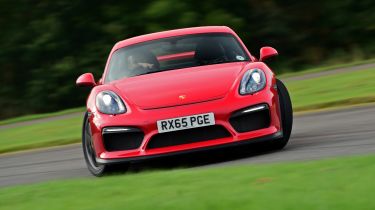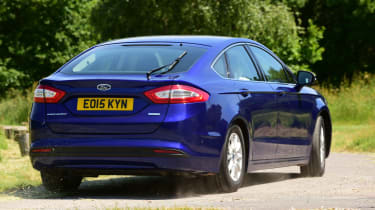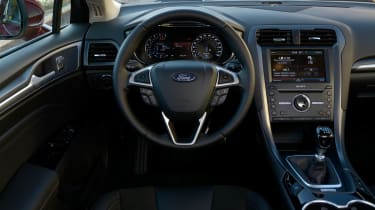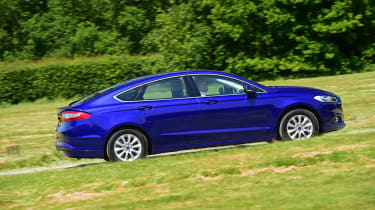New Ford Mondeo Zetec 1.0 Ecoboost review
Can Ford's three-cylinder 1.0-litre Ecoboost engine really shine in the 1,445kg Mondeo? We try it on UK roads to find out

A few years ago, it’d be inconceivable that you could buy a big Ford Mondeo with a 1.0-litre engine. That you now can speaks volumes about the work Ford has done on the remarkable EcoBoost engine. However, there’s no hiding the Mondeo’s 1,445kg kerbweight, meaning performance lacks the sparkle you’ll find in larger engines. Although it’s £2,000 cheaper to buy than the next model in the range, a diesel-powered Mondeo will be cheaper to run.
The Ford Mondeo 1.0 EcoBoost is one of the firm’s most extreme of example of downsizing to date. Although the Mondeo tips the scales at a passenger under 1,500kg, the tiny EcoBoost engine measures just 998cc.
What’s more important, and particularly pertinent here are the engine’s headline figures of 123bhp and 170Nm of torque. On paper that doesn’t compare favourably with the rest of the range, but on the road it’s still fairly capable.
Ford quotes 0-62mph in 12 seconds, which is only fractionally slower than the base-spec 1.5-litre TDCI. That’s got a lot to do with the gearing, where first, second and third are closely spaced, while fourth and above are further apart aiding cruising.
In practice, that means quite a bit of shuffling between the lower gears at round-town speeds, but even then you’ll need dedication to get the best from it. Unlike the diesel engines in the Mondeo range, there’s no real wave of turbocharged torque to ride. The EcoBoost’s power delivery is far more linear, much like a naturally aspirated engine. That also means that overtaking requires a bit of planning. Even in the 1.5-litre TDCI the spikier power delivery means a single downshift is required. Here you’ll likely need two. Refinement on the move is very impressive, though, with the Mondeo’s insulation from noise and vibration isolating the driver from the worst of the three-cylinder engine’s noises and rattles. Even at tickover, it’s hard to hear – or feel – the engine.
However, the relative lack of torque will likely show when the car is loaded with passengers or luggage, or when climbing steep hills. It’s modest 900kg towing capacity is very telling here. Ford claims 55.4mpg on the combined cycle, but during our brief test drive, we struggled to better 33mpg due to the need to rev it past 4000rpm to make swift – if not fast - progress. Longer gearing helps high speed economy though. The Mondeo 1.0’s ride isn’t quite as smooth as other models in the range – you can thank the lighter engine for that. It doesn’t crest bumps quite as well and feels like it could use a little more weight over the front wheels, but you’d be hard pressed to notice once you’ve a few passengers on board.
The flip side of this reduced nose weight is steering that feels a little more alert than other models in the range. It has a greater willingness to change direction, but outright enjoyment is still masked by rather light and overly-assisted steering. Perhaps this model’s biggest trump card is its price. In Zetec trim, as tested here, it represents the cheapest route into Mondeo ownership. A list price of £19,995 is some £2,000 less than the next cheapest model, the 1.5 TDCI in base-spec Style trim. But it can’t compete with the diesel on CO2 emissions. Here the 1.0’s 119g/km plays 94g/km, and the diesel is still fractionally cheaper as a company car. With this engine, the Mondeo will best suit low mileage drivers keen to keep the purchase price as low as possible. But higher mileage drivers might still want to consider a diesel.











